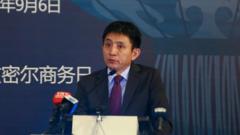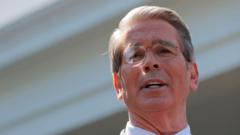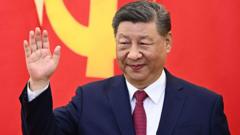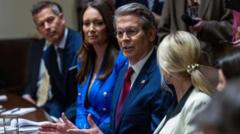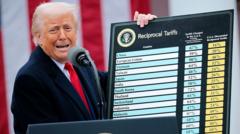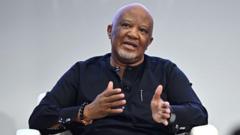In the wake of fresh negotiations, the UK navigates a path fraught with tariff obstacles and geopolitical considerations, posing questions about real economic benefits.
A Trade Deal with the US: Opportunities and Challenges

A Trade Deal with the US: Opportunities and Challenges
The potential for a UK-US trade agreement brings both optimism and complexities to the forefront.
UK Prime Minister Sir Keir Starmer recently met with US President Donald Trump, and discussions have ramped up around a prospective trade agreement between the two nations. US Vice-President JD Vance has expressed optimism, indicating a "good chance" of securing a deal with the UK that may be simpler than establishing agreements with other European nations. Vance commented on the existing "reciprocal relationship" that the US and UK share.
UK’s business and trade minister, Sarah Jones, echoed Vance's sentiments, stating that dialogues are ongoing but refrained from presenting a clear timeline for the negotiations. She emphasized the collective desire to avoid tariffs, affirming that a trade agreement is paramount for the UK. However, the real concern lies in understanding what the term “deal” signifies within these discussions.
Following Sir Keir Starmer's presidential meeting, UK officials referred to the negotiations as an "economic deal," deliberately distinguishing it from a comprehensive free trade agreement that would encompass all goods and services. During Trump’s initial presidency, negotiations were promising until contentious topics such as medicine pricing and food standards dominated the talks. Current discussions reportedly prioritize collaboration in science and technology, particularly regarding artificial intelligence, in exchange for tariff ameliorations.
Complicating matters, the US has imposed a 10% tax on UK imports as part of its "reciprocal tariffs," a baseline intended for all trading partners, and scope for negotiation appear limited. The paradox lies in the UK importing more from the US than it exports, which could skew the perceived benefits of tariffs across the Atlantic. The UK’s automotive sector, facing a hefty 25% tariff on cars, presents another significant concern.
At the same time, the UK grapples with resetting its trade relationships post-Brexit, specifically aimed at facilitating smoother export processes with the EU. There are speculations about how US negotiations might intertwine with UK's renewed focus on export regulations. Additionally, the US has expressed interest in forming alliances to manage China’s economic rise, which might pressure the UK to choose between maintaining robust relations with China or cozying up to US trade interests.
Amidst these complex dynamics, the recent instability in financial markets, particularly concerning US government debt, underscores a growing urgency for the United States to finalize beneficial deals with close allies like the UK. As a result, the UK may now wield more leverage in negotiations than previously assumed. Whether Prime Minister Starmer chooses to capitalize on this situation remains to be seen as both nations strive for solutions in the pursuit of mutual trade interests.


